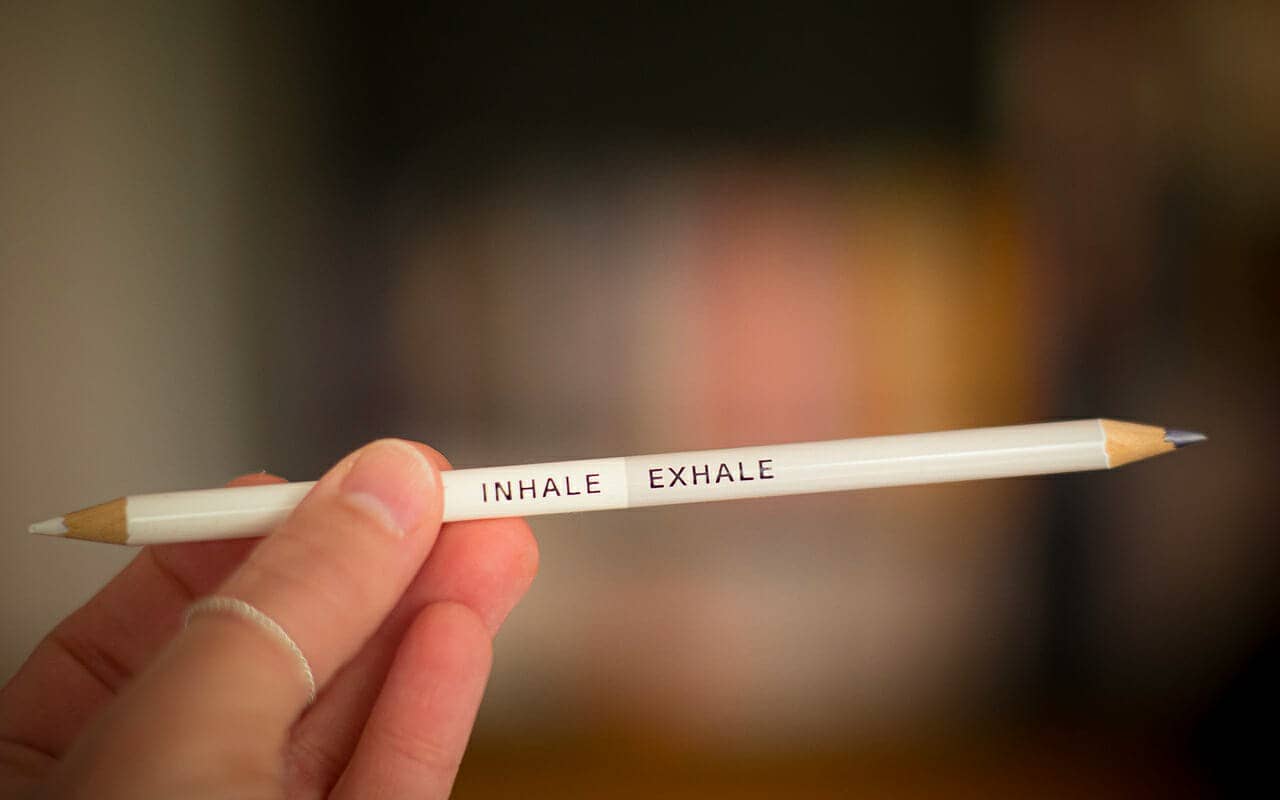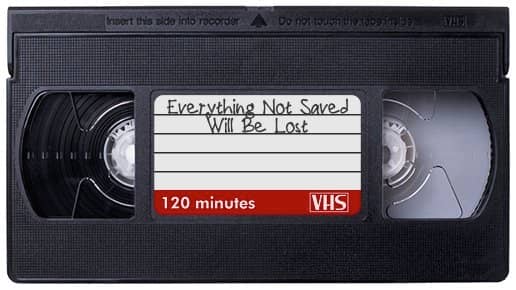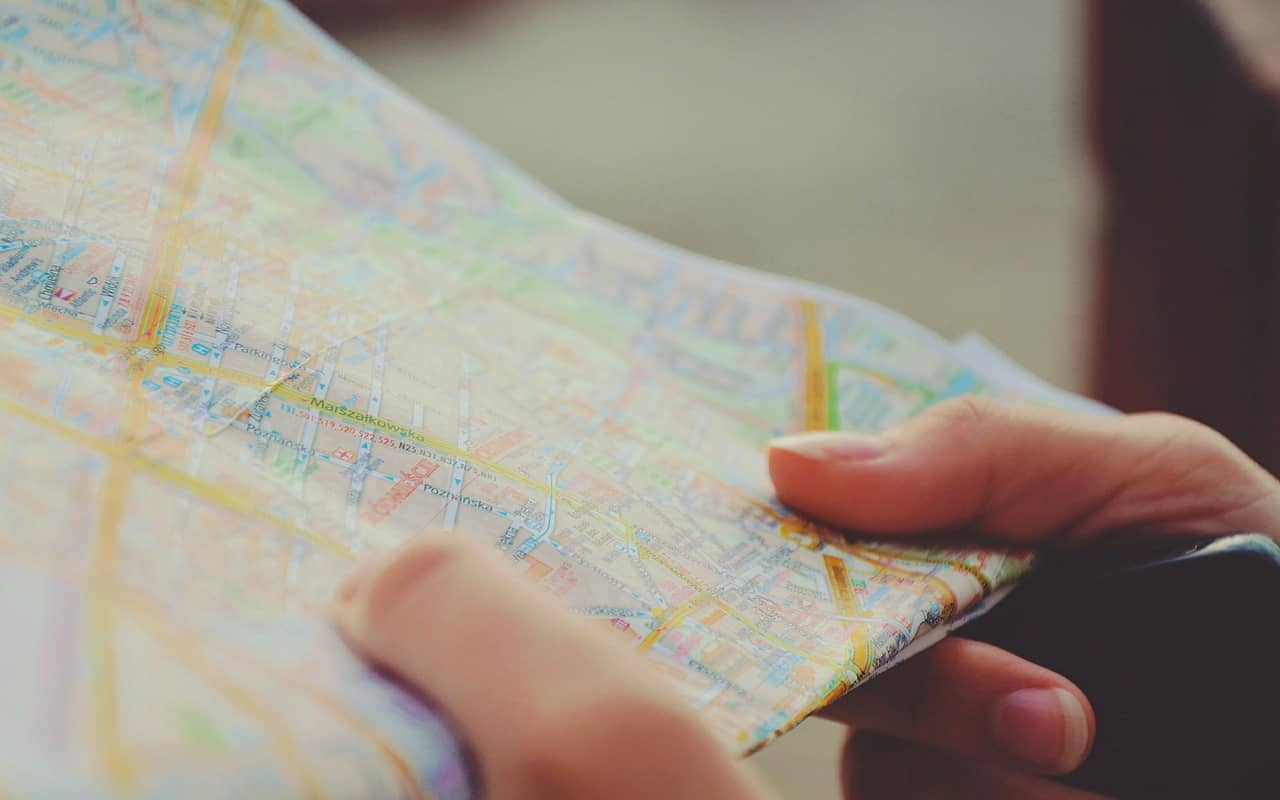Podcast: Download
Subscribe: Apple Podcasts | RSS
 Does anxiety cause memory loss?
Does anxiety cause memory loss?
In a word, yes.
I know this personally because I went through a lot of anxiety during both high school and university.
I’ll tell you more about how I mostly solved and now deal in a mature manner with my anxiety in a moment. But first, here’s something counterintuitive to understand.
Anxiety can also increase your memory in certain situations.
And because anxiety can both help and hinder memory, I’m going to help you identify the specific triggers that lead to negative symptoms on this page. We’ll focus specifically on the kinds of anxiety that rob of you of the ability recall the information you need to remember.
That way, you can expect to see improvements soon.
Even better:
If you’re struggling with anxiety-induced memory loss, you’re not alone.
Memory experts like myself and a memory athlete I’ll introduce you to in a moment have been through it. And because we’re memory experts, our solid solutions are more likely to help you quickly.
My friend is especially interesting because he actually introduces anxiety to help him practice, but until recently was a complete train wreck around anxiety issues in his personal life.
His fixes are fantastic, so please give this page a thorough read. By following the suggestions he and I have for you, I’m confident you’ll find yourself enjoying much better memory soon.
And you’ll benefit from reduced stress and anxiety as a result.
Can Anxiety Really Cause Memory Loss?
Yes…And Here’s How
Anxiety definitely interferes with memory.
In many cases, the damage happens because it’s very difficult to pay attention to incoming information when you’re under duress.
As one study found, anxiety negatively affects what scientists call attentional control.
When I was a teenager and had anxiety attacks, I used to flee the classroom and run to the nearest church.
My anxiety got worse instead of better because I had zero control over my attention. The panic attacks forced me to pay attention only to the pressure on my chest that made me feel like I could not breathe.

Later, I went through a similarly bad anxiety attack while delivering a lecture at the University of Saarland.
During this episode, it wasn’t merely that I couldn’t remember what I wanted to tell the students as I started sweating and experience dry mouth at the podium.
I failed to focus on my delivery because a sudden lack of attentional control caused me to focus on my physical distress.
Both my high school and professional lecturing episodes are highly specific states of memory loss caused by anxiety.
And the weird thing is that, although they impede learning and memory in the moment, the episodes themselves are highly memorable to me. That’s because stress can help form memories in certain circumstances.
As Sallie Baxendale points out in Coping With Memory Problems, stress can also lead to the formation of what are called flashbulb memories. Often the stress of shock is involved, such as when someone famous like John F. Kennedy of Princess Diana passes away.
The point is that anxiety and memory loss cut both ways depending on the nature of the stimulus.
How to Identify the Trigger Behind Your Memory Loss
Here’s where things can get tricky.
If you’re in an anxious state, it can be hard to remember the last five or ten minutes to figure out what might have triggered the episode.
But as three-time USA Memory Champion John Graham shared with us on the Magnetic Memory Method podcast, figuring out what’s happening in your body is a huge part of solving the problem.
That’s where you start: By scanning your body and then breathing into it.
I’ve got more tips to share and recommended steps to follow for you in a moment.
But I wanted to start with John’s personal story because his findings are both useful and inspiring. I’m so glad he found the courage to share what was going on in his life and the solutions he found. As you’ll learn from our discussion, some of his best solutions came from noticing how his body forced his attentional awareness onto physical symptoms.
Only by starting at the level of how his body was triggered was he able to find the path to calming his mind.
Of course, John likes to add anxiety in the context of memory training prep for competition. He calls it “chaos training.” It helps him prepare for the stress he gladly exposes himself to during the nerve-wracking matches he lives to attend.
So the lesson here is again that anxiety cuts both ways when it comes to how it your ability to retrieve information. It’s important to use it in certain circumstances, and remove it in others.
Now that you know a bit more about the need to identify the triggers that might be causing your anxiety and related memory loss, what follows are some powerful steps you can take.
They’re all based on my own path to reliable solutions and science-backed. I’ve studied this topic for many years as part of solving my issues.
Let’s dive in.
One: Seeing a Doctor is Never Silly
When I found myself in a lecture hall going completely blank as my heart pounded in front of nearly one hundred students, I stopped the lecture. After I regained stability, I went straight to a clinic.
Even though I felt silly about it, I’m a PhD, not a medical doctor. It was worth the time, energy and money to get checked out.
As Richard Shames points out in Thyroid Mind Power, there are many hormone issues that could be causing the anxiety and memory loss. Only a doctor can help you get to the bottom of issues like these if they’re taking place.
Keep this fact in mind too. Even if you’re eating foods that improve memory, most people’s bodies run on a 72 hour digestion cycle.
This means that you could mistakenly think that too much coffee earlier in the morning is the cause of your anxiety. In reality, it could be something you ate two days ago that is “suddenly” causing an issue.
For more on the reasons why our physical condition and digestive processes are related to stress-induced memory problems, check out the following scientific paper on the stress-digestion connection.
Two: Journal to Find Your Triggers
Few of us spend enough time in reflective thinking about our lives.
But in just five minutes a day of journaling for self development purposes, you can rapidly spot triggers. I’ll talk more about how I use it further down this page.
For now, I suggest journaling in a print notebook, but this study found that stress-reduction occurred even for those journaling online.
You can also seek out Writing to Heal, which includes exercises you can follow. They’re scientifically verified processes that help your body produce chemicals that restore you physically. According to Dr. Jeffrey Lieberman, writing can also reduce stress by calming the amygdala.
Three: Plan the Best Possible Interventions
Since each person is different, you’ll need to combine your doctor’s advice with your own findings through journaling.
Over the years of food journaling I discussed in The Victorious Mind, I’ve worked out a variety of diets that help me avoid anxiety issues.
I’ve also learned how to avoid situations that spike my stress levels. It’s not always possible because no one has a crystal ball. But being able to reduce them is very helpful.
Finally, adding guided visualizations designed for stress reduction have been very helpful. Concentration meditation routines have also helped me develop better attentional control.
That way, if I have an anxiety attack, I’m able to finish the lecture I’m giving without having to abandon it. Knowing what’s happening and having insight into why you’re experiencing mental blocks from stress is tremendously reassuring.
The key is to make sure you combine medical support and personal insight through journaling.
5 Common Symptoms of Anxiety-Induced Memory Loss
Now, I’ve mentioned the feeling of your chest tightening and not being able to focus due to attentional control.
But what are some of the other symptoms of anxiety-induced memory loss?
Let’s have a look.
Overall Cognition
Cognition means the ability to think and arrive at conclusions. Scientists have found that stress and anxiety can impede this ability greatly.
When I’m stressed, I find that thinking slows down incredibly. For example, things change on the Internet all the time. Decisions have to be made, but it can be hard to make them. Then, when decisions are made, it can be hard to remember them.
But once you’ve got your anxiety issues in check, you can start completing some cognition exercises to improve your overall abilities in this area.
And when decisions feel especially difficult to make, it can be useful to simply write down your options. Then roll some dice and pick one. Action helps ease anxiety and creates perspective once you’re moving.
Sensory Perception
One of the major memory problems people with stress and anxiety face is that they don’t notice things in the first place.
For example, your visual memory will be impeded if your attentional control causes you to miss visible information.
Likewise, you might fail to hear things while under stress, which messes with your echoic memory. Then there are verbal memory issues and problems like the Ugly Sister Effect.
The craziest thing is that when anxiety causes you to lose sensory perception, you’re not even aware of it.
This is why we sometimes get in arguments.
“I told you that already,” your partner says in a frustrated voice. The reason you didn’t hear them is simple. Anxiety prevented you from paying attention.
A simple antidote is to simply share the fact that you’re feeling stressed out. You can even ask people to write down what they want to tell you so you’re able to pay better attention to it later.
Losing Track of Important Items
People suffering anxiety and stress often misplace things.
Worse, you may feel even more stressed when you cannot quickly find items you’ve lost.
The good news is that there are ways to stop losing the important objects you need in daily life. You can explore simple solutions like keeping them in the same place intentionally. Or you can try techniques like the Memory Palace.
Forgetting What People Tell You
Conversations are packed with so much important information. We can feel like we’ll remember what we’re told, but then later, it’s nearly impossible to track our way back to the message.
Although this problem is related to sensory perception, it’s also a semantic memory issue. This kind of problem can take place when we think we know what certain works mean, but in fact do not. It can also be the case that the person you’re listening to is misusing the words because they don’t remember their proper meaning.
It’s especially troubling that many people struggling the most often forget what their doctors tell them. So much healing would take place if people could only remember to follow medical directions.
The good news that there are ways to remember more from conversations you can explore. I highly recommend pursuing each of them.
Recalling and Following Directions
One of the saddest things that happens to people is getting lost.
As Christopher Kemp shows in his book, Dark and Magical Places, not keeping track of directions costs societies around the world in many ways. We lose in terms of productivity, family commitments and personal fulfilment.
As usual, there are solutions. It’s just a matter of getting started with memory techniques that can help you remember details related to where you’re trying to go.
5 Coping Mechanisms for Generalized Anxiety and Memory Loss
In addition to seeing a doctor, monitoring your symptoms through journaling and working on your diet, here are some additional things you can do.
One: Optimize Your Sleep
Lack of sleep causes increased anxiety because it throws off the levels of important chemicals in your body.
You can also learn more about sleep and memory specifically. There are many solutions that will help you get more sleep if your life needs attention in this area.
Two: Learn New Things
Although taking on new learning tasks is not an alternative to getting medical attention, once you have a treatment plan, taking up a new learning project certainly can be.
The positive outcome of experiencing reduced anxiety happens because learning new skills exercises your brain. In many cases, you’ll also meet new people, which scientists have shown promotes your health.
Three: Practice Neurobics
Neurobics are simple and activities that actively challenge your brain. As they do, they stimulate neurogenesis that can help resolve certain stress issues.
Here’s a simple activity:
With your left hand try to draw a circle in the air while trying to draw a square in the right hand.
For more challenge, try to draw a square with the left hand and a triangle with the right hand.
I’ve got a bunch more neurobics for you in this video as well:
I can’t think of a time when using a few of these haven’t reduced my anxiety. Neurobics are so engaging, it’s difficult for them not to help take your mind away from stress.
Four: Memory Training
As Dr. Tim Dalgleish has shown, memory techniques like the method of loci have helped people reduce symptoms of PTSD and depression.
Using mnemonics has certainly helped me in this regard as well. Nic Castle was courageous enough to share his story on my podcast as well. He was a police officer who suffered PTSD with anxiety and memory blackouts, but these were reduced once he got into memory training.
Exercising your memory is not a magic bullet. But once you’ve seen a doctor and worked on your overall health, it does provide a great supplement to those primary efforts. Memory Science has demonstrated the positive outcomes many times.
This point is very important because coping mechanisms are just that: strategies that help you cope. That’s why this next section is so important, even if it’s also a bit repetitive.
Since these techniques are all so well-proven, they’re well-worth repeating in my view.
Five: Write Down Important Information
Although I specialize in helping people remember information purely in their minds, I use writing a lot.
Memory expert Lynne Kelly has shown in her book, The Memory Code, that using our hands is one of the best ways to remember more.
I journal nearly every day for this reason. Because I run a popular YouTube channel on top of this website and the Magnetic Memory Method Podcast while writing new books and creating new courses, it reduces my stress and anxiety substantially to keep a written record of the many key details involved in managing so many tasks.
I also use a variety of physical journals as part of a larger self-help through journaling practice. But some of my friends use software programs like Obsidian.
My fellow memory expert and mental athlete Johannes Mallow uses spreadsheets as part of how he tracks his personal progress. His memory competition performances are amongst the most anxiety-inducing I’ve seen, yet journaling as he does helps him manage very well.
The Best Advice for Anxiety and Memory Loss
The Internet is packed with all kinds of advice. And some of thing things people say can make it tempting to avoid proper medical treatment when you need it.
But it’s absolutely a must to seek medical input because we can’t guess at our blood levels. So many people mistake their memory loss symptoms with stress and anxiety when in fact something quite different is going on.
With the right medical opinion, you could be looking at a quick fix, one that lets you get back on track and enjoy better memory faster than you might think. Not everything comes down to memory training in the ways I discuss on this blog, after all.
Plus, a doctor can help you think through whether you have anxiety and short-term memory loss or long term memory issues. It’s astonishing how many people think they have short term memory issues when they’re actually long term memory problems, or vice versa.
Either way, once your doctor gives you the green light, consider taking my FREE Memory Improvement course:
It will help ensure that you have a solid path towards improving your memory.
And that’s important because it could be simply having poor memory that is causing your anxiety in the first place.
I know that it used to bother me before I took my first memory improvement course and started to see results.
And, as mentioned, I still deal with anxiety. I just do it a lot better than I used to when I was in high school and university thanks to following the simple steps we discussed today.
So what do you say?
Are you feeling enlightened on the potential issues that might underly your memory loss induced by anxiety?
Please take good care around this issue and feel free to keep me posted on your progress with this critical issue.
Related Posts
- Memory Loss Story And Memory Recovery Tips With Jennie Gorman
Memory loss is frightening. However, the solution may be simpler than you think. Jennie Gorman's…
- Memory Athlete Braden Adams On The Benefits Of Memory Competition
Braden Adams is one of the most impressive memory athletes of recent times. Learn to…
- Long-Term Memory Loss: 5 POWERFUL Prevention Tips
What is long-term memory loss? What are its causes, symptoms, and how do you prevent…













